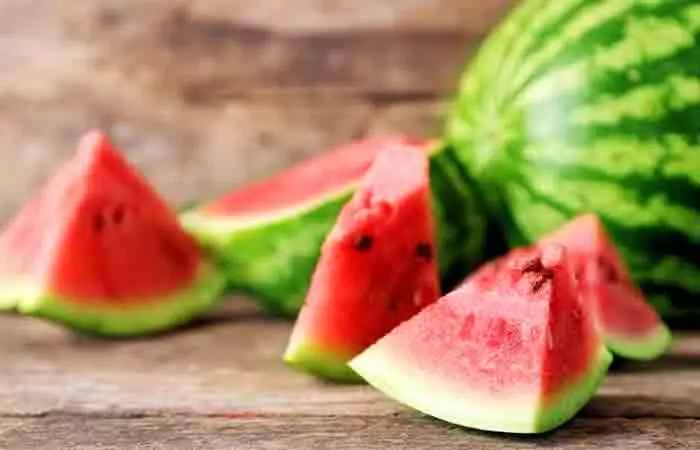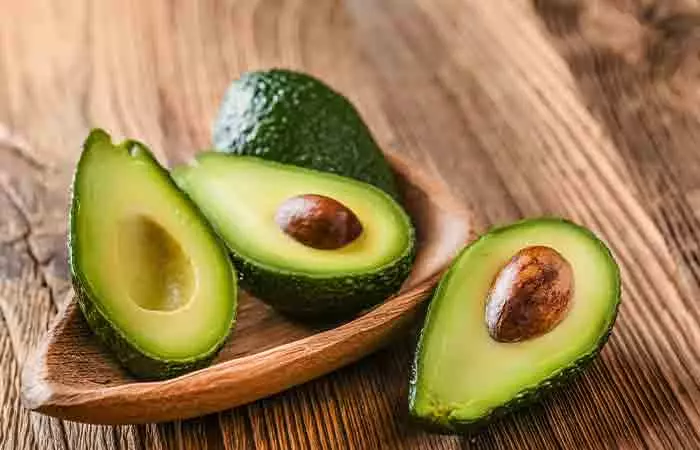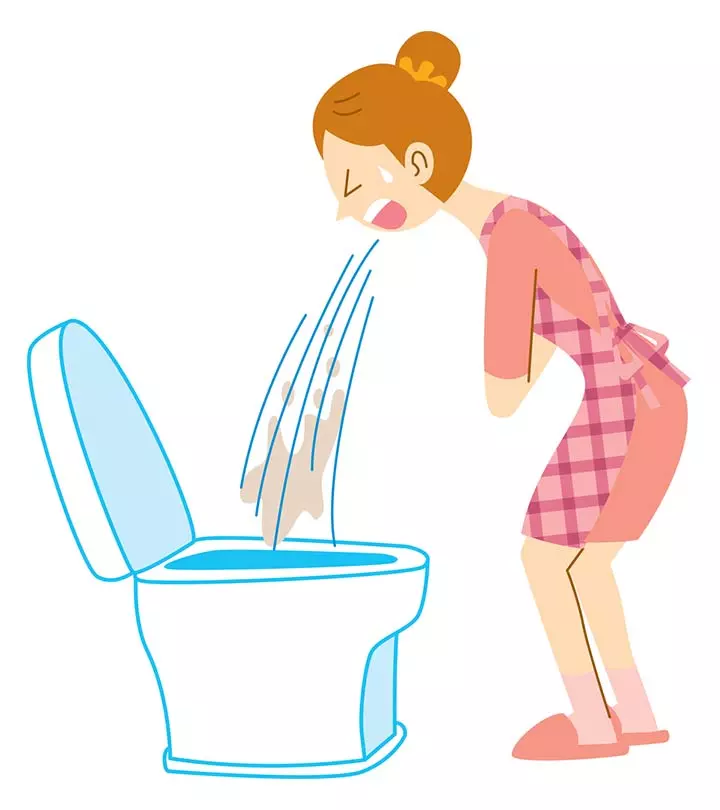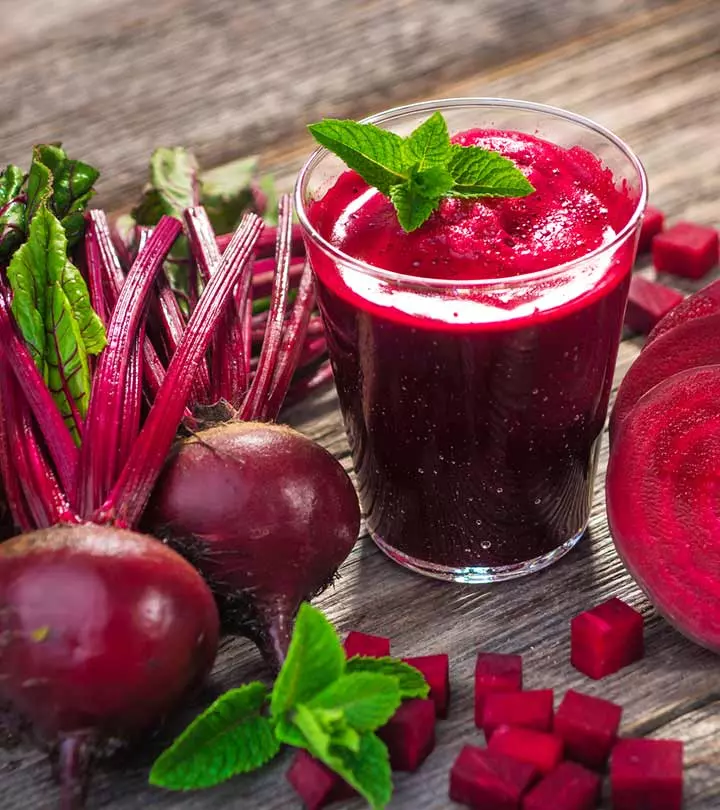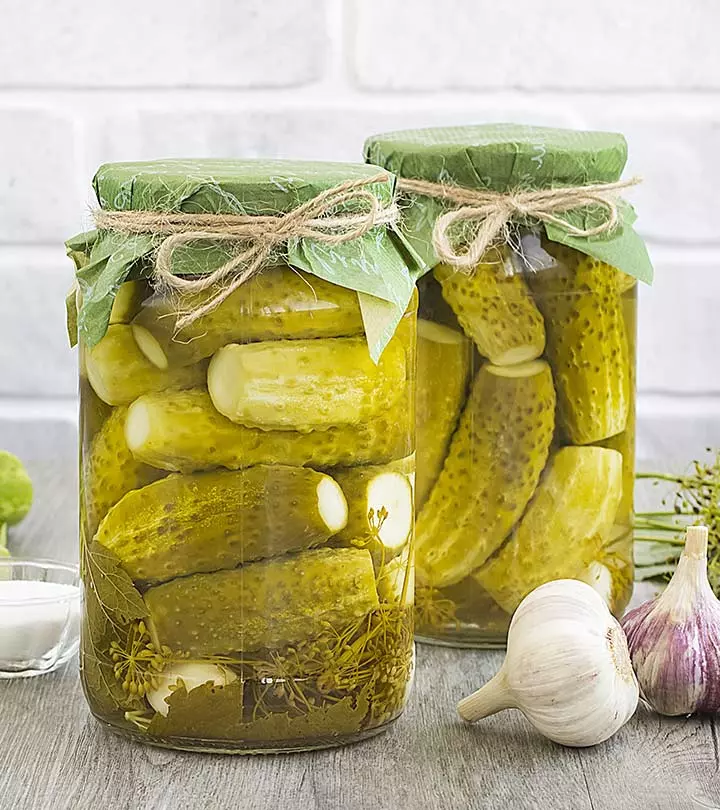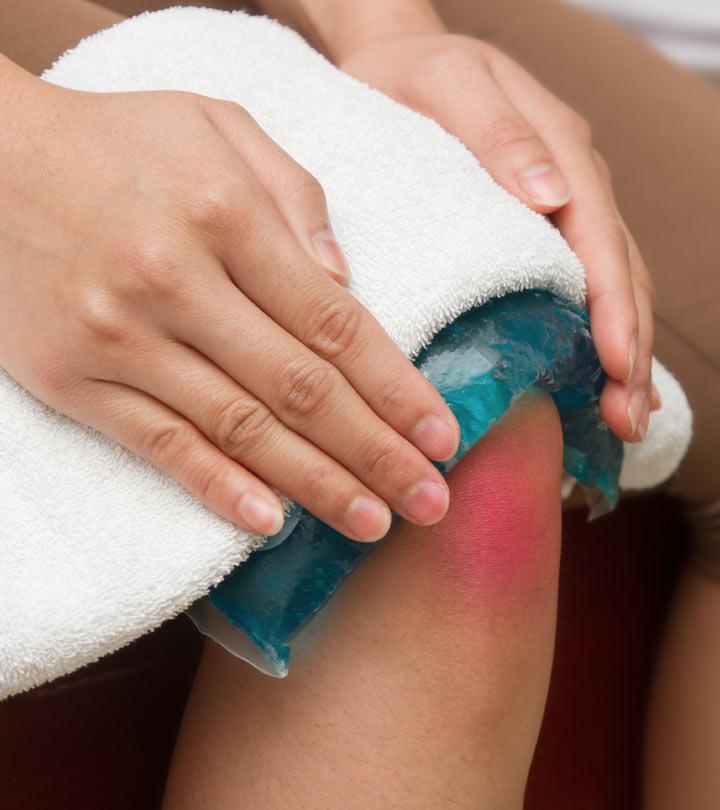How To Stop Throwing Up After Drinking Too Much Alcohol
Easy tips and foods to recover from flushing out the excess alcohol in your body.

Image: Shutterstock
The experience of throwing up after drinking is awful, and it may wear off the buzz. However, this may signal that your body is trying to tell you something important and may indicate an underlying concern. The article explains why alcohol makes you throw up and how to recover from it. Read on.
In This Article
Why Does Alcohol Make You Throw Up?
It is evident that any kind of alcohol could be toxic to our health. The body may take a lot more effort to break down these alcoholic substances. When one consumes alcohol, the liver enzymes break it down into acetaldehydei A naturally occurring colorless and flammable liquid or gas with a suffocating smell produced on a large scale by industries. . However, when the acetaldehyde levels get too high in the liver, our body reacts by making us vomit. This way, you are flushing out the excess alcohol that your liver is finding hard to break down (1).
An excessive amount of alcohol may also irritate the lining of your stomach. This, in turn, may cause acid to build-up and make you nauseous (1).
This might cause you to throw up. But is throwing up after drinking related to alcohol poisoning? Learn more about it below.
While throwing up after drinking could be related to alcohol poisoning, this may not always be the case.
Alcohol poisoning is a serious and potentially life-threatening condition characterized by confusion, seizures, slow or irregular breathing, and impaired memory (2).
It is important to recognize the signs of alcohol poisoning and not dismiss vomiting as a common side effect of alcohol consumption. Vomiting occurs when the blood alcohol concentration reaches around 0.2% to 0.4%. This affects vital functions like heart rate and breathing (2).
According to a 2021 survey, 84.0% of Americans aged 18 or older drank alcohol at some point in their life. Out of these, 86.2% were men, and 81.9% were women. Further, 51.7% of Americans from this age group reported drinking alcohol during the month before this survey, and 23.3% reported binge drinking during this time. Additionally, 6.4% of the population indulged in heavy alcohol use during the month.
These are a few reasons alcohol may cause you to throw up. However, if you want to know how to stop vomiting after drinking alcohol, here’s a list of foods you can consume to enhance recovery. Read on.
What To Consume After Throwing Up?
1. Water
When you can’t stop throwing up after drinking, your body is likely to get dehydrated. Hence, keep drinking water to keep your body hydrated. Regular fluid intake may also help treat your hangover. According to Pallini Winnifred, a Registered Dietitian Nutritionist, it is important to drink water or other hydrating fluids after vomiting from any cause, as vomiting can lead to dehydration. She adds, “However, it is important to drink fluids slowly and in small amounts to avoid further nausea. If you are unable to keep fluids down or are experiencing severe dehydration, it is important to seek medical attention.”
2. Coffee/Tea
The caffeine in coffee or tea doesn’t do much to cure your hangover. However, drinking these beverages the night after a heavy drinking session may help reduce your headache and the whole groggy effect.
3. Bananas
When you throw up after drinking, your body loses important electrolytes and becomes dehydrated. Bananas are rich in potassium, which may help restore the body’s electrolytes and aid in your recovery. However, more research is warranted in this regard.
4. Watermelon
Watermelon contains 92% water (3). Hence, eating watermelon after a night of heavy drinking may help restore your body’s hydration.
5. Avocado
Apart from bananas, avocados can also be a great source of potassium (4). Avocado is also known to help treat liver injury (5). As heavy drinking may cause harm to the liver, eating avocado could be considered beneficial.
6. Oranges
Oranges are rich in vitamin C. Studies show that vitamin C can elevate glutathionei A naturally occurring antioxidant found in microorganisms, plants, and humans, where it is produced in the liver. levels in the blood (6). Glutathione is an antioxidant that helps detoxify your body and the liver (7).
7. Oatmeal
Oatmeal is rich in carbohydrates that may help elevate your sugar levels and mood. It may help you deal with hangover fatigue. Additionally, oatmeal contains several nutrients that also may boost your energy levels and fight fatigue (8).
8. Green Tea
Green tea is believed to speed up the process of alcohol metabolism and reduce the chances of liver injury (9). Drinking green tea may soothe your mind and body too.
 Quick Tip
Quick TipWhile these foods may help with your recovery, it is important to note that throwing up or emesis after drinking alcohol does have its own side effects.
Side Effects Of Throwing Up After Drinking Alcohol
- Apart from feeling awful due to vomiting continuously, you will also suffer from headaches, stomach upset, and body aches.
- Excess drinking followed by throwing up may cause excess dehydration and affect your kidneys. Make sure to rehydrate yourself.
- Some may also experience gastrointestinal bleeding. In extreme cases, you may breathe in your vomit that may travel into your lungs and lead to pneumonia.
 Quick Tip
Quick TipUsually throwing up after drinking doesn’t require a doctor’s attention. However, in few cases, you must visit a doctor as soon as possible.
When To See A Doctor?
- If you haven’t stopped throwing up even after 24 hours of drinking.
- If you show signs of dehydration like dizziness and inability to pee.
- If you have a fever.
- If you find traces of blood in your vomit.
Winnifred says, “If you have consumed a large amount of alcohol and are experiencing symptoms, such as vomiting, dizziness, or difficulty breathing, it is important to seek medical attention immediately. These symptoms can be signs of alcohol poisoning, which can be life-threatening.”
Infographic: How Not To Throw Up After Drinking
Throwing up after drinking is a terrible experience that leaves you regretting all your lifestyle choices every time it happens. It is also detrimental to your health as you lose electrolytes and stand the risk of severe dehydration. Of course, there are ways to feel better and stop further vomiting, but as the cliche goes, prevention is better than cure.
So, check out this infographic to learn about some tricks and a few do’s and don’ts to avoid puking after drinking again. Illustration: StyleCraze Design Team
Drinking alcohol can be fun, but the after-effects of binge drinking can cause the high to fade quickly. Throwing up after drinking is a classic symptom of excessive alcohol consumption. So, make sure you eat or drink something hydrating and nutritious to replenish your health and electrolytes. Follow our advice to recover quickly from throwing up. These remedies are effective as they use natural ingredients that boost liver function and balance electrolytei An electrically charged medium containing ions that conduct electricity or electric charge when the ions move. levels. However, if the condition persists along with other worrying symptoms, consult your healthcare provider. It is recommended that you limit your alcohol intake rather than learning how to not throw up after drinking.
Frequently Asked Questions
Is it good to throw up when drunk or hold it in?
While many want to know how to not throw up when drinking, it is in fact better to throw up if you are feeling nauseous after drinking. Nausea and vomiting are often signs that your body has more alcohol than it can effectively process. Therefore, while throwing up doesn’t feel great, it may be helpful to get rid of the excess alcohol or acid buildup by letting it out rather than forcefully holding it in. However, avoid forceful vomiting.
Is it normal to throw up after only a few drinks?
Throwing up after a few drinks can be a sign of alcohol intolerance, and causes vomiting, nausea, and headaches. If you frequently vomit or experience other adverse effects after drinking, you should see a doctor as it is not considered normal and healthy.
Can throwing up after drinking alcohol be dangerous?
Yes, throwing up after consuming alcohol can be dangerous, particularly if it is accompanied by additional symptoms like confusion, seizures, or breathing difficulties.
Key Takeaways
- During the breakdown of alcohol, acetaldehyde is formed in the liver, and when it becomes too high, our bodies react by making us vomit.
- You may also feel nauseated after drinking excessive alcohol because it can make your stomach lining irritated, causing acid to build up.
- Drinking plenty of fluids and consuming fruits like watermelon and orange can help you replenish and recover after throwing up.

Image: Stable Diffusion/StyleCraze Design Team
Drinking excessively can cause our bodies to reject it, resulting in vomiting. But what is the science behind this? Watch this video to learn why this occurs.
References
Articles on StyleCraze are backed by verified information from peer-reviewed and academic research papers, reputed organizations, research institutions, and medical associations to ensure accuracy and relevance. Read our editorial policy to learn more.
- Alcohol hangover – mechanisms and mediators
https://www.ncbi.nlm.nih.gov/pmc/articles/PMC6761819/ - Ethanol Toxicity
https://www.ncbi.nlm.nih.gov/books/NBK557381/ - Watermelon lycopene and allied health claims
https://www.ncbi.nlm.nih.gov/pmc/articles/PMC4464475/ - Hass avocado composition and potential health effects
https://www.ncbi.nlm.nih.gov/pmc/articles/PMC3664913/ - Liver injury suppressing compounds from avocado (Persea americana)
https://pubmed.ncbi.nlm.nih.gov/11368579/ - Vitamin C elevates red blood cell glutathione in healthy adults
https://pubmed.ncbi.nlm.nih.gov/8317379/ - Glutathione depletion and recovery after acute ethanol administration in the aging mouse
https://www.ncbi.nlm.nih.gov/pmc/articles/PMC1930162/ - Nutritional advantages of oats and opportunities for its processing as value added foods – a review
https://www.ncbi.nlm.nih.gov/pmc/articles/PMC4325078/ - Effects of beverages on alcohol metabolism: potential health benefits and harmful impacts
https://www.ncbi.nlm.nih.gov/pmc/articles/PMC4813215/
Read full bio of Dr. Sandeep Jassal
- Pallini Winnifred, RDN, serves over 200 clients in the NYC area. She has a bachelor's degree in Nutrition Science from Stony Brook University and two years of experience in nutrition counseling.
 Pallini Winnifred, RDN, serves over 200 clients in the NYC area. She has a bachelor's degree in Nutrition Science from Stony Brook University and two years of experience in nutrition counseling.
Pallini Winnifred, RDN, serves over 200 clients in the NYC area. She has a bachelor's degree in Nutrition Science from Stony Brook University and two years of experience in nutrition counseling.
Read full bio of Arshiya Syeda
Read full bio of Dipti Sharma






